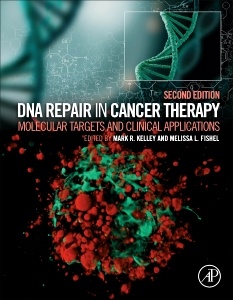DNA Repair in Cancer Therapy (2nd Ed.) Molecular Targets and Clinical Applications
Coordonnateurs : Kelley Mark R., Fishel Melissa L.

DNA Repair and Cancer Therapy: Molecular Targets and Clinical Applications, Second Edition provides a comprehensive and timely reference that focuses on the translational and clinical use of DNA repair as a target area for the development of diagnostic biomarkers and the enhancement of cancer treatment.
Experts on DNA repair proteins from all areas of cancer biology research take readers from bench research to new therapeutic approaches. This book provides a detailed discussion of combination therapies, in other words, how the inhibition of repair pathways can be coupled with chemotherapy, radiation, or DNA damaging drugs.
Newer areas in this edition include the role of DNA repair in chemotherapy induced peripheral neuropathy, radiation DNA damage, Fanconi anemia cross-link repair, translesion DNA polymerases, BRCA1-BRCA2 pathway for HR and synthetic lethality, and mechanisms of resistance to clinical PARP inhibitors.
1. Overview of Current Targets and Clinical Trials: Bench to Clinic2. MGMT a Critical DNA Repair Gene Target for Chemotherapy Resistance3. Blockade of Base Excision Repair: Inhibition of Small Lesions Results in Big Consequences to Cancer Cells4. PARP Inhibitors - Scientific Rationale and Clinical Development for Cancer5. Inhibiting Selective DNA Polymerases for Therapeutic Intervention6. Targeting the Nucleotide Excision Repair Pathway for Therapeutic Applications7. Homologous Recombination and ATM/ATR Targets8. DNA Double Strand Break Repair by Nonhomologous End Joining and its Clinical Relevance9. Mismatch repair10. DNA Repair Signaling Targets11. Personalized Cancer Medicine: DNA Repair Alterations is a Promising Predictive Marker in Cancer12. The Role of DNA Damage and Repair in Neurotoxicity Caused by Cancer Therapies13. Radiation DNA damage and use in cancer/therapeutics/dna repair14. Fanconi Anemia- cross-link repair15. Translesion DNA polymerases16. BRCA1-BRCA2 pathway for HR and synthetic lethality17. Synthetic lethality18. Mechanisms of Resistance to Clinical PARP Inhibitors
Dr. Fishel is a DNA repair expert who is highly published and is at the forefront in the development of new tumor models focusing on DNA repair pathways in cancer.
- Provides a comprehensive overview of the basic and translational research in DNA repair as a cancer therapeutic target
- Includes timely updates from the earlier edition, including Fanconi Anemia cross-link repair, translesion DNA polymerases, chemotherapy induced peripheral neuropathy, and many other new areas within DNA repair and cancer therapy
- Saves academic, medical, and pharma researchers time by allowing them to quickly access the very latest details on DNA repair and cancer therapy
- Assists researchers and research clinicians in understanding the importance of the breakthroughs that are contributing to advances in disease-specific research
Date de parution : 06-2016
Ouvrage de 464 p.
19x23.3 cm
Thèmes de DNA Repair in Cancer Therapy :
Mots-clés :
alternative NHEJ; anticancer agents; apurinic apyrimidinic endonuclease 1; base excision repair; BRCAness; cancer; cancer stem cells; canonical NHEJ; cardiotoxicity; cell cycle regulation; chain termination; checkpoints; chemical biology; chemo-potentiation; chemosensitization; chemotherapy-induced DNA damage; chemotherapy-induced peripheral neuropathy; Chk1; cisplatin; classical NHEJ; cognitive dysfunction; damage response; DNA damage; DNA damage response; DNA double-strand break repair; DNA mismatch repair; DNA polymerases; DNA repair; DNA replication errors; DNA synthesis; DNA-damaging agents; double-strand break repair; drug resistance; DSB repair; EGFR; Fanconi anemia; fludarabine; gemcitabine; genome instability; genotoxic damage; Glioma therapy; homologous recombination inhibitors; HRD signature; immune-checkpoint inhibitors; inhibitors; interstrand crosslink; MAP kinases; MGMT inhibitors; MGMT promoter methylation; MGMT stem cell transfer; microhomology-mediated NHEJ; myopathy; noncanonical NHEJ; nonhomologous end joining (NHEJ); nuclease; nucleoli; nucleoside analogs; nucleotide excision repair; O6-alkylating anticancer drugs; O6-methylguanine-DNA methyltransferase (MGMT); oncogene-induced DNA damage model for cancer development; ototoxicity; oxidative damage; PARP; PARP1; poly(ADP-ribose) polymerase; prognostic/predictive value of MGMT; RAD51; radiotherapy; reactive oxygen species; recombination; repair inhibitors; replication; replication protein A; replication stress; signal transduction; small molecules; synthetic lethality; targeted therapy; targeting; translational science; translesion synthesis; ubiquitin; xeroderma pigmentosum



